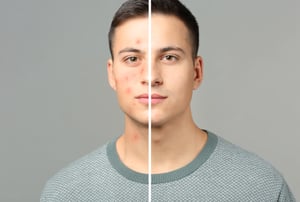 Acne can be a frustrating and uncomfortable skin condition. While acne most commonly occurs during the teenage years, it can happen at later ages as well. However, no matter your age or the severity of your acne, there are several ways that a dermatologist can help to prevent and treat this persistent and potentially recurring ailment. Let’s take a closer look the signs, causes, and treatment options for acne.
Acne can be a frustrating and uncomfortable skin condition. While acne most commonly occurs during the teenage years, it can happen at later ages as well. However, no matter your age or the severity of your acne, there are several ways that a dermatologist can help to prevent and treat this persistent and potentially recurring ailment. Let’s take a closer look the signs, causes, and treatment options for acne.
What is Acne?
Acne is a skin condition that occurs when hair follicles are clogged with dead skin cells and oil. When this happens, blackheads, whiteheads, and pimples appear on the skin. Acne is typically found on the face, upper back, shoulders, and chest - body parts with the most sebaceous, or oil, glands. Whiteheads are caused by closed, plugged pores. Blackheads are caused by open, plugged pores. Small, tender, red bumps can also occur, these are called papules. When papules have pus at their tips they become pustules, more commonly referred to as pimples. Other types of acne include nodules, which are solid, large lumps underneath the surface of the skin that can be painful. Cystic lesions are similar to nodules, they are painful, pus-filled lumps under the skin.
What Causes Acne?
There are four major factors that contribute to the development of acne. Excessive sebum, or oil, production, inflammation, bacteria, and clogged hair follicles all cause acne. Acne can also be triggered or worsened by stress, diet, and hormonal changes.
How Can Acne be Treated by a Dermatologist?
When acne becomes persistent, painful, and unresponsive to simple, self-care remedies, it is time to seek treatment from a dermatologist. Most acne treatments are topical, meaning they are applied directly to the skin. Some topical solutions are used to eliminate bacteria, others are designed to reduce oil, the of the main contributing factors of acne. Other types of medication like antibiotics, birth control (for women) and isotretinoin can be effective for combatting hormone changes, inflammation, and more serious acne types like cysts and modules.
If left untreated, chronic acne leave permanent scars, dark spots, and other blemishes on the skin. Your dermatologist will diagnose the grade of acne on a scale of one to four and prescribe a treatment plan to eliminate your acne, cysts, or nodules, and restore health and clarity to your skin.
At Lane Dermatology, we care about your skin as much as you do. Dr. Ashley Record and Dr. Jessica LeBlanc are committed to long-term skin care health for people of all ages including children and teens.



.png?width=110&height=110&name=lane%20badge%20(1).png)
